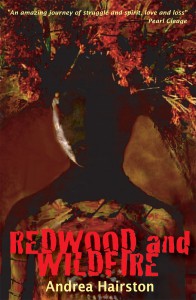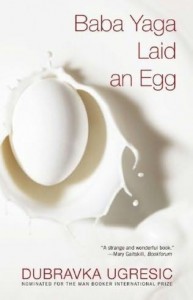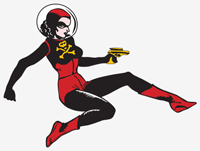The 2011 jury is closing recommendations at the end of this month and zeroing in towards winners and an honor list: This year’s jurors are: Lynne Thomas (chair), Karen Meisner, James Nicoll, Tansy Rayner Roberts, and Nisi Shawl. Please recommend anything you read that you think is an interesting exploration and expansion of gender here
2011 Otherwise Award Winner announced!
Redwood and Wildfire by Andrea Hairston (Aqueduct Press, 2011) is the winner of the 2011 James Tiptree Jr. Award.

Redwood and Wildfire was a favorite of the jurors from the moment they read it. They reported: “This vivid and emotionally satisfying novel encompasses the life of Redwood, a hoodoo woman, as she migrates from rural Georgia to Chicago at the turn of the 20th century. While Redwood’s romance with Aidan Wildfire is central to the novel, female friendship is also a major theme, without deferring to the romance. Hairston incorporates romantic love into a constellation, rather than portraying it as a solo shining star. Her characters invoke a sky where it can shine; they live and love without losing themselves in cultural expectations, prejudices and stereotypes, all within a lovingly sketched historical frame.
“Intersections of race, class, and gender encompass these characters’ entire lives. They struggle with external and internal forces around questions of gender roles, love, identity, and sexuality. This challenge drives how they move through the world and how it sees them. The characters in Redwood and Wildfire deftly negotiate freedom and integrity in a society where it’s difficult to hold true to these things.”
This year’s jurors were Lynne Thomas (chair), Karen Meisner, James Nicoll, Tansy Rayner Roberts, and Nisi Shawl.
Honor List
In addition to selecting the winner, the jury chose a Tiptree Award Honor List. The Honor List is a strong part of the award’s identity and is used by many readers as a recommended reading list for the rest of the year. This year’s Honor List is:
Libba Bray, Beauty Queens (Scholastic Press 2011) — In this atypically comedic Tiptree candidate, a cast of iconic characters trapped on a hostile island (populated by the capitalist analog of Doctor No) illuminates the limited palette of roles for women and offers the hope of more rewarding and rounded lives.
L. Timmel Duchamp, “The Nones of Quintilus” (in her collection Never at Home, Aqueduct Press 2011) — This standout story addresses the relationships between mothers and daughters and how the world looks different when you become (or intend to become) pregnant.
Kameron Hurley, God’s War (Night Shade Books 2011) — Set on a marginally habitable world divided by a common religion with diverse interpretations, this engaging work explores a militaristic matriarchal society.
Gwyneth Jones, The Universe of Things (Aqueduct Press 2011) — Running through these gorgeous stories is a fierce awareness of how gender roles and other social power imbalances are always factors in how we think, how we approach one another, how we see the world. The author questions the status quo, and then questions the questioning, so what emerges is a mature, honest, thoughtful complexity.
Alice Sola Kim, “The Other Graces” (Asimov’s Science Fiction, July 2010) — This elegantly written short story revisits the role of mirroring in self-actualization and casts that path in a new and skiffy light as its heroine, Grace, is mentored by her older alternate selves. It also depicts racial/cultural intersections with gender roles.
Sandra McDonald, “Seven Sexy Cowboy Robots” (Strange Horizons, 2010.10.04) — A surreal and subversive take on human-AI relations. An older female character exploring her sexuality is a rare thing in science fiction, and it is refreshing to see it handled here with such a deft hand.
Maureen F. McHugh, “After the Apocalypse” (in her collection After the Apocalypse, Small Beer Press 2011) — This title story of an impressive collection brings to the foreground gender expectations concerning the practice of motherhood in extreme situations and then completely and matter-of-factly upends them.
Delia Sherman, The Freedom Maze (Big Mouth House 2011) — A clear-hearted, magically immersive time travel story that explores powerful ideas. Thrown back through time to an antebellum plantation, a thirteen-year-old comes to understand how women’s experience is shaped by cultural expectations as they interweave with social, economic, and racial truths.
Kim Westwood, The Courier’s New Bicycle (Harper Voyager Australia 2011) — This compelling novel depicts a variety of sexually transgressive characters and looks at themes of fertility and alternate family structures through a dystopic lens.
The jury also named a “long list” of books worth mentioning, which is available at the link at the top of this page.
2010 Otherwise Award Winners Announced!
2010 Tiptree Award Winner Announced!
The James Tiptree, Jr. Literary Award Council is pleased to announce that the 2010 Tiptree Award is being given to Baba Yaga Laid an Egg, by Dubravka Ugresic (Canongate, 2010).

Baba Yaga Laid an Egg impressed with its power and its grace. Tiptree juror Jessa Crispin explains that the beginning of the book
“does not scream science fiction or fantasy. It starts quietly, with a meditation on the author’s aging mother, and the invisibility of the older woman…. But things shift wholly in the second act, with a surreal little tale of three old ladies, newly moneyed, who check into an Eastern European health spa. There’s another revolution in the third act, where what looks like a scholarly examination of the Russian fairy tale hag erupts into a rallying cry for mistreated and invisible women everywhere.”
Crispin notes that the fairy tale figure Baba Yaga is the witch, the hag, the inappropriate wild woman, the marginalized and the despised. She represents inappropriateness, wilderness, and confusion.
“She’s appropriate material for Ugresic, who was forced into exile from Croatia for her political beliefs. The jurors feel Baba Yaga Laid an Egg is a splendid representation of this type of woman, so cut out of today’s culture.”
Honor List
The Honor List is a strong part of the award’s identity and is used by many readers as a recommended reading list for the rest of the year. This year’s Honor List is:
The Bone Palace by Amanda Downum (Orbit 2010) — noted for a deliciously complicated plot that challenges 21st century Earth attitudes toward transfolk. One juror noted that this book came closest among the honor list to meeting her Tiptree ideal by including a character that not only embodies a challenge to prescribed roles, but also creates a crack in or addition to the structure that carries forward to future generations.
The Hundred Thousand Kingdoms by N.K. Jemisin (Orbit 2010) — set in a matriarchal society where the privilege and expectations between the sexes are reversed, while the gender roles are different but recognizable (and believable).
Diana Comet and the Disappearing Lover by Sandra McDonald (published as “Diana Comet,” Strange Horizons, March 2 & March 9, 2009) — a (true) love story, in which the author does something simple but radical with the identity issues at play.
Drag Queen Astronaut by Sandra McDonald (Crossed Genres issue 24, November 2010) — a wonderful exploration (and ultimately an affirmation) of a gender presentation that tends to be ignored or ridiculed.
The Secret Feminist Cabal by Helen Merrick (Aqueduct Press 2009) — an academic look at the history of early feminism in science fiction, science fiction criticism, and fandom that provides a valuable documentation of our beginnings
Who Fears Death by Nnedi Okorafor (DAW 2010) —A strong female lead character breaks out of restrictive gender roles to change her life, perhaps changing history as a result. A well-written perspective on prejudice and discrimination and the lessons needed to overcome their bonds on our identities and imaginations.
Living with Ghosts by Kari Sperring (DAW 2009) — an unusual perspective in a main character —a feminized man who makes much of his living as an escort/high-class sex worker who sees ghosts when he is not expecting — or expected — to be able to do so. An excellent read.
The Colony by Jillian Weise (Soft Skull Press 2010) — Takes on the idea that pervades our culture that women have to be perfect in order to have sex with men. One juror notes: “I’ve never read a book that made a woman with one leg so sexually normal.” Smart and well written with subtle gender politics.
In addition to the honor list, this year’s jury also compiled the following “long list” of additional works they found worthy of attention:
Beth Bernobich, Passion Play (Tor 2010)
Stevie Carroll, “The Monitors” (in Echoes of Possibilities, edited by Aleksandr Volnov, Noble Romance Publishing 2010)
Roxane Gay, Things I Know About Fairy Tales (Necessary Fiction, May 13, 2009)
Frances Hardinge, Gullstruck Island (MacMillan 2009)
Julia Holmes, Meeks (Small Beer Press 2010)
Malinda Lo, Ash (Little, Brown 2009)
Alissa Nutting, Unclean Jobs for Women and Girls (Starcherone Books 2010)
Helen Oyeyemi, White Is for Witching (Doubleday 2009)
Rachel Swirsky, Eros, Philia, Agape (Tor.com, March 3, 2009)
This year’s jurors were Penny Hill (chair), Euan Bear, Jessa Crispin, Alice Sola Kim, and Lawrence Schimel.
2008 Otherwise Award Winners announced!
A gender-exploring science fiction award is presented to Patrick Ness for The Knife of Never Letting Go and Nisi Shawl for Filter House.
The Knife of Never Letting Go by Patrick Ness and Filter House by Nisi Shawl
The James Tiptree, Jr. Literary Award Council (otherwiseaward.org) is pleased to announce that the 2008 Tiptree Award has two winners: Patrick Ness’s young adult novel, The Knife of Never Letting Go (Walker 2008) and Nisi Shawl’s short story collection, Filter House (Aqueduct Press, 2008).
The Tiptree Award will be celebrated on Memorial Day weekend at WisCon in Madison, Wisconsin. Each winner will receive $1000 in prize money, an original artwork created specifically for the winning novel or story, and (as always) chocolate.
A panel of five jurors selects the Tiptree Award winners and compiles an Honor List of other works that they find interesting, relevant to the award, and worthy of note. The 2008 jurors were Gavin J. Grant (chair), K. Tempest Bradford, Leslie Howle, Roz Kaveney, and Catherynne M. Valente.
The Knife of Never Letting Go begins with a boy growing up in village way off the grid. Jury chair Gavin J. Grant explains, “All the villagers can hear one another’s thoughts (their “noise”) and all the villagers are men. The boy has never seen a woman or girl so when he meets one his world is infinitely expanded as he discovers the complications of gender relations. As he travels in this newly bi-gendered world, he also has to work out the definition of becoming and being a man.”
Juror Leslie Howle praises Ness’s skills as a writer: “Ness is a craftsman, plain and simple. The language, pacing, complications, plot this story has all of the elements that raise the writing to something well beyond good. Some critics call it brilliant. It’s a page-turner, and the story continues to resonate well after reading it. It reminds me of the kind of classic SF I loved when I was new to the genre.”
In addition to the Tiptree Award, The Knife of Never Letting Go also won the 2008 Booktrust Teenage Prize (U.K.), which celebrates contemporary fiction for teenagers, and the Guardian Children? Fiction Prize.
Publishers Weekly, which selected Filter House as one of the best books of 2008, described it as an “exquisitely rendered debut collection” that “ranges into the past and future to explore identity and belief in a dazzling variety of settings.” Tiptree jurors spotlight Shawl’s willingness to challenge the reader with her exploration of gender roles.
Juror K. Tempest Bradford writes, “The stories in Filter House refuse to allow the reader the comfort of assuming that the men and women will act according to the assumptions mainstream readers/society/culture puts on them.”
Juror Catherynne M. Valente notes that most of Shawl’s protagonists in this collection are young women coming to terms with womanhood and what that means “in terms of their culture, magic (almost always tribal, nuts and bolts, African-based magical systems, which is fascinating in itself), [and] technology.” In her comments, Valente points out some elements of stories that made this collection particularly appropriate for the Tiptree Award: “‘At the Huts of Ajala’ struck me deeply as a critique of beauty and coming of age rituals. The final story, ‘The Beads of Ku,’ deals with marriage and motherhood and death. ‘Shiomah’s Land’ deals with the sexuality of a godlike race, and a young woman’s liberation from it. ‘Wallamellon’ is a heartbreaking story about the Blue Lady, the folkloric figure invented by Florida orphans, and a young girl pursuing the Blue Lady straight into a kind of urban priestess-hood.”
Buy this year’s Tiptree Award winners as well as winners from the past.
The Tiptree Award Honor List is a strong part of the award? identity and is used by many readers as a recommended reading list for the rest of the year. This year’s Honor List is:
- Christopher Barzak, The Love We Share Without Knowing (Bantam, 2008)
- Jenny Davidson, The Explosionist (HarperTeen, 2008)
- Gregory Frost, Shadowbridge and Lord Tophet: A Shadowbridge Novel (both published by Del Rey, 2008)
- Alison Goodman, Two Pearls of Wisdom (HarperCollins Australia 2008), published in the United States as Eon: Dragoneye Reborn (Viking 2008), also Eon: Rise of the Dragoneye in the United Kingdom
- John Kessel, Pride or Prometheus (Magazine of Fantasy and Science Fiction, January 2008)
- Margo Lanagan, Tender Morsels (Knopf, 2008)
- Ursula K. Le Guin, Lavinia (Harcourt)
- John Ajvide Lindqvist, Let the Right One In (Quercus (UK) 2007), original Swedish title Låt den rätte komma in (2004), first published in English as Let Me In, St. Martin’s Press (2007), Translated by Ebba Segerberg)
- Paul Park, A Princess of Roumania (Tor, 2005), The Tourmaline (Tor, 2006), The White Tyger (Tor, 2007), The Hidden World (Tor, 2008)
- Ekaterina Sedia, The Alchemy of Stone (Prime Books)
- Ali Smith, Girl Meets Boy (Canongate U.S., 2007)
- Ysabeau S. Wilce, Flora’s Dare: How a Girl of Spirit Gambles All to Expand Her Vocabulary, Confront a Bouncing Boy Terror, and Try to Save Califa from a Shaky Doom (Despite Being Confined to Her Room) (Harcourt, 2008)
Buy this year’s Tiptree Award honored books.
Reading for the 2009 Tiptree Award will soon begin. As always, the Tiptree Award invites everyone to recommend works for the award. Please submit recommendations to nominate@otherwiseaward.org.
